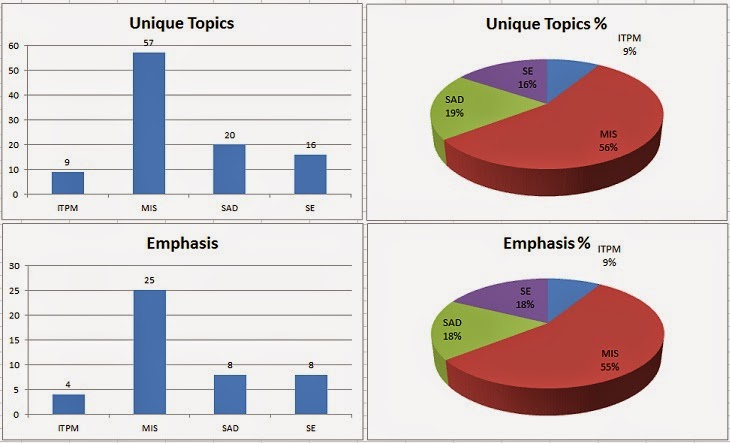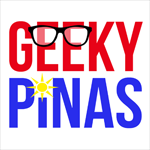Developers are both the backbones and the rock stars of many tech firms that specialize in application development. Backbones because there won't be any software without anyone eating code for breakfast, and rock stars because of their own air of entitlement: they make the apps that make money, and consequently they get paid the most. They code by trade and passion. Coding is both their comfort zone and their source of stress. A good number of them won't be willing to trade this comfort zone--but they do outgrow their shells, eventually.
No man is an island. Love them or, well, not love them so much, they do need other people to lean on to. As you read along, I suggest that you closely pay attention to the top two subjects dominating each of the four career tracks. I'll spare you how I came up with the figures, but if you want to investigate deeper, here's the link to my LinkedIn post.
The tech-job/college-subject match-making
I call the business analyst, QA, technical writer and project manager roles soft-skill-based IT careers for application development. They don't require you to be the code geek (but it does pay to be the "geek", meaning someone who is passionate about his work). Rather, it asks of you to be the monitor, communicator, coach and the "bad cop" charged with bridging the gaps between the company and the client, the products and the users.
So, I came up with a survey of job openings closely related to software application development within a two-month time frame, confined only to locations within Metro Manila. I took three (later five) for each of the four career tracks, then matched their requirements with contents of textbooks of IT Project Management (Schwalbe), Management Information Systems (Oz), Systems Analysis and Design (Hoffer) and Software Engineering (Saleh).
Business analysts would typically gather from a client company their business rules, functional areas and company data to turn them into software specifications: sets of structures, behaviors and permissions for intended users. They do the most interfacing, both internally (within the team) and externally (between team and client). It's not surprising that for those who took up Bachelor of Science in Information Technology (BSIT) or Information Systems (BSIS), Systems Analysis and Design (SAD) would dominate over other closely-related disciplines like IT Project Management (ITPM), Management Information Systems (MIS) and Software Engineering (SE). Since SAD is using the tools for gathering requirements right, SE will ensure that you gather them right the first time, all the time!
Let's face it: perfect software cannot be built by imperfect people. Developers can be rock stars, but never gods (and they take cues from BA's). The QA specialist should see to it that they have every kind of test to expose just about anything that can go wrong. They must also have a history of tests and results since quality is never really a finished process. For all of quality's process orientation, SE takes the lead in the must-study disciplines for anyone looking to take this role. Like a Chinese horoscope, it is complemented well by either ITPM (for organization, estimation and costing), or SAD (for its part in the Implementation phase of any software life cycle).
No book or subject prepares one to be a PM other than ITPM. Managing software development projects is just like managing any other project (like building a house) in that you are constrained by scope, time and cost. Information Technology project management also covers several other knowledge areas that include quality and risk management. Its closest compliment is SAD since a PM must know the people, phases and instruments that build software.
No man is an island. Love them or, well, not love them so much, they do need other people to lean on to. As you read along, I suggest that you closely pay attention to the top two subjects dominating each of the four career tracks. I'll spare you how I came up with the figures, but if you want to investigate deeper, here's the link to my LinkedIn post.
The tech-job/college-subject match-making
I call the business analyst, QA, technical writer and project manager roles soft-skill-based IT careers for application development. They don't require you to be the code geek (but it does pay to be the "geek", meaning someone who is passionate about his work). Rather, it asks of you to be the monitor, communicator, coach and the "bad cop" charged with bridging the gaps between the company and the client, the products and the users.
So, I came up with a survey of job openings closely related to software application development within a two-month time frame, confined only to locations within Metro Manila. I took three (later five) for each of the four career tracks, then matched their requirements with contents of textbooks of IT Project Management (Schwalbe), Management Information Systems (Oz), Systems Analysis and Design (Hoffer) and Software Engineering (Saleh).
Business Analyst (BA)
Business analysts would typically gather from a client company their business rules, functional areas and company data to turn them into software specifications: sets of structures, behaviors and permissions for intended users. They do the most interfacing, both internally (within the team) and externally (between team and client). It's not surprising that for those who took up Bachelor of Science in Information Technology (BSIT) or Information Systems (BSIS), Systems Analysis and Design (SAD) would dominate over other closely-related disciplines like IT Project Management (ITPM), Management Information Systems (MIS) and Software Engineering (SE). Since SAD is using the tools for gathering requirements right, SE will ensure that you gather them right the first time, all the time!
Software Quality Assurance (QA) Specialist
Let's face it: perfect software cannot be built by imperfect people. Developers can be rock stars, but never gods (and they take cues from BA's). The QA specialist should see to it that they have every kind of test to expose just about anything that can go wrong. They must also have a history of tests and results since quality is never really a finished process. For all of quality's process orientation, SE takes the lead in the must-study disciplines for anyone looking to take this role. Like a Chinese horoscope, it is complemented well by either ITPM (for organization, estimation and costing), or SAD (for its part in the Implementation phase of any software life cycle).
Project Manager (PM)
No book or subject prepares one to be a PM other than ITPM. Managing software development projects is just like managing any other project (like building a house) in that you are constrained by scope, time and cost. Information Technology project management also covers several other knowledge areas that include quality and risk management. Its closest compliment is SAD since a PM must know the people, phases and instruments that build software.
Technical Writer (TW)
Management Information Systems (MIS) tops the list of disciplines to study as a TW must be knowledgeable on how different subsystems actually come together, based on putting one's self in the shoes of of those who will actually use the software product. In spite of that, the real discipline that should be on top of a TW's must-study list is English communication skills, particularly effective speaking and writing. Technical writers are often tasked to produce instruction manuals that are easy to follow, the writing of which is easier said than done.
Overall
If you're not yet sure what career path to follow in the domain of application development--but you're sure that you don't eat code for breakfast--you may follow the overall chart to help you determine your priority subjects. It can be daunting if you are already applying for a job and not know what to focus on, but knowing that SAD is handily the most versatile subject for IT career mobility, you'll find your direction in no time. This is only a rough guide, though, if only to help you maximize your time and get you started on your career sooner.
This topic was presented by this Author in the IT Field Trips and Seminars class of St. Paul University Quezon City as "Making Sense: Soft-Skill-Based IT Careers" on September 2014 for the Graduating IT Class of 2015.
This topic was presented by this Author in the IT Field Trips and Seminars class of St. Paul University Quezon City as "Making Sense: Soft-Skill-Based IT Careers" on September 2014 for the Graduating IT Class of 2015.






